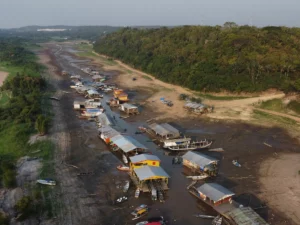Climate change significantly increased the likelihood of last year’s severe drought in the Amazon, a study by the World Weather Organization (WWA) reveals.
This international team of scientists discovered that human-induced climate change made the drought 30 times more probable. They focused on the period from June to November.
Lead author Ben Clarke explains that El Niño did play a role, but climate change was the key factor, especially due to higher temperatures.
The Amazon, known for its rich biodiversity and role as the world’s largest carbon sink, faces increasing threats from these higher temperatures and ongoing deforestation.
This drought had widespread impacts. It affected 30 million people dependent on the Amazon River and its tributaries, disrupting crops and transport.

Indigenous and riverside communities were particularly hard hit. Fish migration patterns changed, threatening a major food source.
The drought also led to more wildfires and killed many river creatures, including 150 pink dolphins.
Large-scale farming activities worsened the conditions by decreasing soil moisture.
Environmental anthropologist Simone Athayde from the University of Florida noted that local communities were aware of the lower water levels but didn’t foresee the drought’s severity.
Amazon’s Escalating Drought Crisis
The U.S. Drought Monitor classified it as a level 4 or “exceptional” drought. Without climate change, it would have been a milder, level 2 “severe” drought.
The Amazon has faced similar challenges before, with notable droughts in 2005, 2010, 2015, and 2020.
However, the 2023 drought had unique aspects. Researchers warn that with a 2°C rise in global temperatures, such droughts could occur four times more often every 10 to 15 years.
Clarke emphasizes the need for new ways to classify these emerging climate phenomena.
Regina Rodrigues, a co-author and professor at the Federal University of Santa Catarina in Brazil, points out the growing length of the dry season as a concerning trend.
To mitigate these challenges, Athayde urges better preparation for droughts. This includes plans for emergency medicine delivery and food production strategies.
She highlights the importance of controlling deforestation and promoting ecological restoration. Coordinated efforts among Amazon countries are vital for tackling these issues.

